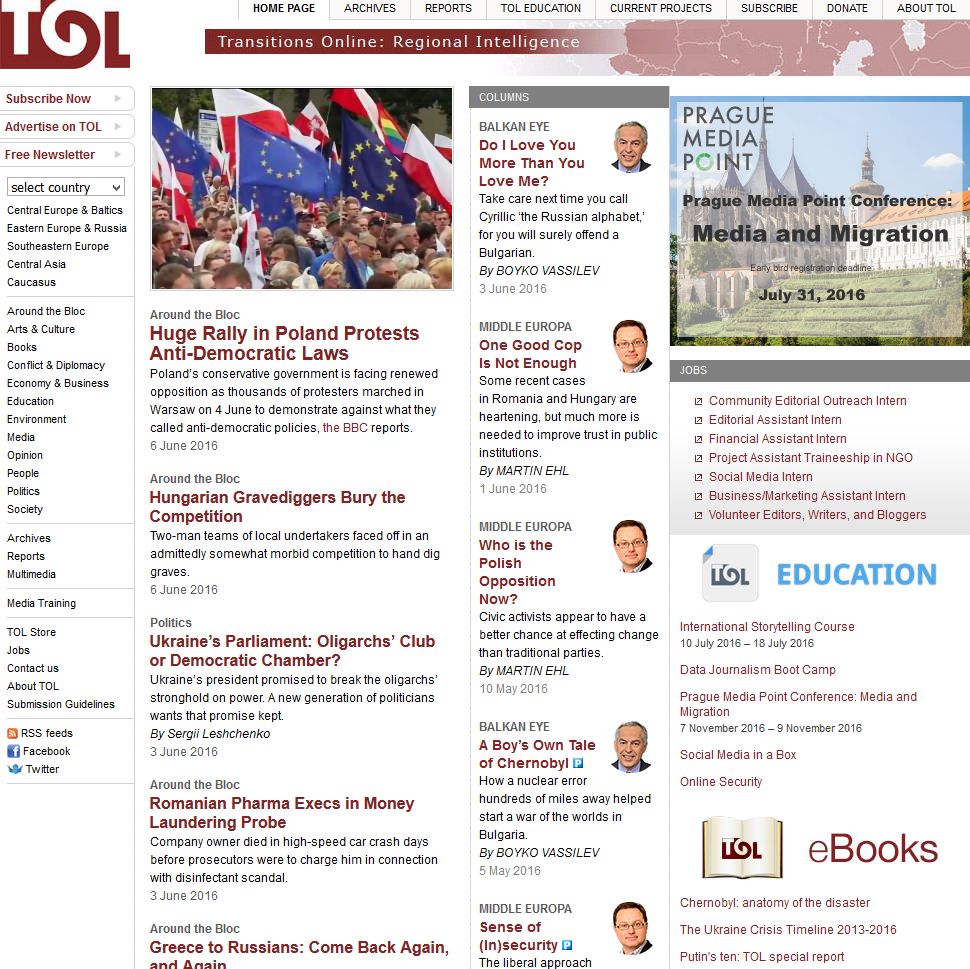
Around the Bloc: Vegan Café Attacked in Tbilisi
Disruption appears to be work of far-right extremists acting against a symbol of an alternative lifestyle.
More...We kindly inform you that, as long as the subject affiliation of our 300.000+ articles is in progress, you might get unsufficient or no results on your third level or second level search. In this case, please broaden your search criteria.

Disruption appears to be work of far-right extremists acting against a symbol of an alternative lifestyle.
More...
This text articulates global capitalism as an imperial formation, it deems that modernity is a particular project and/or discursive rhetoric, as well as it articulates necropolitics as the dominant form of politics in capitalism in the post 9/11 era. Hence, global capitalism is being treated here as the imperial formation and a relation of dominance which fundamentally resides on colonial epistemologies and governing logic. Modernity is, therefore, being articulated as a particular discursive rhetoric of the First World which universalizes modernity in order to conceal and/or repress other formats of organizing modernity and, in order to apply and normalize various premodern logics and ideologies, such as racism, as foundations on the basis of which social differentiation and capitalist hierarchies of exploitation are being organized. Finally, this text articulates the concept of necropolitics which is an obscene form of politics that has, in the post 9/11 era, been reduced to a form of management of death and to a machinistic form of governing that treats the world as if it is just a commodifiable category.
More...
This study analyses the book named “Beyoğlu Rapsodisi” of Ahmet Ümit, who is one of the successful Contemporary Turkish Literature in the light of main assumptions of three theories of criminology. Here a literary critique is not made nor does it criticize the book. The aim is to examine the rich content of the book in the light of theories and to create a reference to theories. As a matter of the fact that assuming what was underlined in the text as the representation of the field and explaining with theories somehow identifying the real with literary construct. This process that contains problems is tried to be enlightened under the light of the “social disorder” and “anomy” and the concepts of the Developmental Criminology so as the events in the book are explained with these theories. Of these theories the first is called social disorder. This theory accepts the city as an ecosystem and explains the social pattern of the city with Darwin’s notion of “wild life”. Migration, poverty, marginalization and crime are the phenomena of the city. Neighborhood of Beyoğlu and the life going on there are tried to be explained with the conceptual sets of this approach. And our second theory is that of the developmental criminology. This theory asserts that there is a sessional relationship between the life practice of a culprit and the moment of taking part in crime. This claimed relationship between life variable and crime and the types of crime is adapted to the novel to try to understand the life sequence of a murderer. Lastly, I make use of the theory of anomy to explain crime and deviation. The theory of anomy tries to understand that how as a result of prevention, tension and oppression individuals lean toward crime and deviation to achieve a goal
More...
Introduction: The article presents an overview of quality management effectiveness issues in a healthcare organization. The purpose of this article is to investigate the most applicable international and Russian quality management models within healthcare organizations and to estimate their effectiveness. Materials and Methods: The research methods include General scientific methods of empirical and theoretical knowledge, General logical methods and techniques and methods of system analysis, comparison, analogy, generalization, the materials of sociological and expert research of the factors influencing the sustainability of a healthcare organization. A review of the literature on the problem covered the period from 2013 to 2016. The key aspect of research papers sampling was a study of the effectiveness of quality management in a healthcare organization. Results: The analysis revealed that, despite the peculiarities of national health systems in different countries, there are three fundamental approaches to the quality management system in a healthcare organization: 1. assessment of quality control of healthcare by third parties, i.e. quality assessment when conducting licensing or accreditation; 2. from building the internal system of healthcare organization quality management, for example, on the basis of ISO 9001; 3. the development of a system of sustainable development within the organization and, consequently, improving the efficiency of internal processes contributing to the quality of healthcare.The article describes the main problems of effectiveness of the abovelisted approaches. Conclusions: In conclusion, the author notes that the level of sustainable development of the organization does not depend on compliance with the minimum mandatory requirements for the healthcare quality. However, if TQM principles are applied to the other support processes, the healthcare quality level remains consistently high over a long period of time.
More...
The concept of “feminine writing” has caused much controversy in time. It appeared in France after the feminist movements in 1970, as a reaction to the lack of visibility of women writers, and it had three important stages. The first, temporally placed right after the events, whose spokeswoman was Hélène Cixous and was marked by her disputatious spirit. In the second stage, between the 80s and the 90s, a less troubled period, as the revolutionary enthusiasm decreased, the works of reference are those signed by Béatrice Didier and Christine Planté. A third stage is the one we are in at the moment – the stage from the beginning of the millennium – characterized by the fact that gender studies are more and more frequent and the efforts to reinstate a literature that has been ignored for a long time, as well as the concern to bring to the fore the literary femininity multiply. If in the period before the postmodernist era feminine literature had certain peculiarities due also to the social situation of women in a masculine society, nowadays the process of un-differentiation – a reflex of an equality that women gained with so much difficulty – is also manifested in the writing field.
More...
Příspěvek ke genezi bezpečnostní teorie a konceptu vnitřní bezpečnosti
Internal security and so-called soft threats such as extremism, radicalism, or organizedcrime have not long been considered a legitimate part of security studies as a branchof international relations. The aim of this study is to show how the meaning of internalsecurity has changed in security research. Previously, issues of internal security havebeen discussed mainly as part of criminology, sociology or criminal law, and nowadaysthey are an integral part of security studies. The central part of the study is anintroduction to a wide variety of approaches to internal security - from the traditionalconcept of internal security as an objective state, through a social construct, and adiscourse, to security practice. The paper consists of two parts. Firstly, it focuses onthe genesis of security theory and the emergence of internal (soft) security in the 80'sand related concepts such as Homeland Security, regime security or Innere Sicherheit.The second part presents two main approaches to the research of internal security -problem solving theories and critical security theories - and summarizes their benefitsand limitations.
More...
Islamist territorially anchored violent non-state actors (ITAVNSAs) seeking to change the status quo of the current international system constitute one of the greatest challenges the international order based on mutual respect of equal sovereign states. These actors in areas without the presence of power states use explicit cross-border violence to achieve their objective in accordance with universal Islamist ideology – the construction of a caliphate. The paper presents in the theoretical and modern historical perspectives methods of reduction of anarchy in the international system – power, economic, legalistic and normative – and highlights the reasons why face to face of these actors, these heretofore functional ways, be it on a regional or system level of analysis, fail.
More...
Following article deals with the Kurdish diaspora in Middle-Europe at the background of current conflict with so called Islamic State. Kurds are one of the main actors of this strong regional conflict and their diaspora in Germany and Austria are forced to react to such a situation. The text is focused not only on actual situation in Syria and Iraq, but mainly on Kurdish reaction towards it. Not only for Czech reader there is interesting part dealing with Kurdish community in Czech Republic, although this diaspora is not as numerous and strong as in Germany or Austria. One of the important outcomes of the article is an attempt to predict future scenarios of Kurds situation development. But it is necessary to mention the high dynamics of conflict with Islamic State complicates any such an attempt of prediction.
More...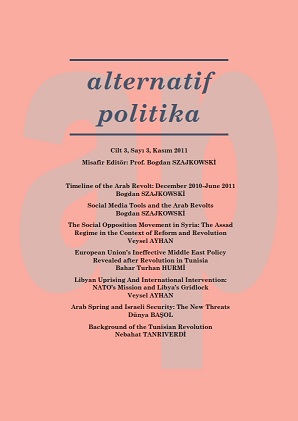
The aim of the article is to evaluate Israel’s security perceptions about the Arab Spring. The study argues that The Arab Spring is the reshuffling of the Middle East by realigned U.S.-Turkish common policies. For Israel the devil you know is more acceptable than the unknown future. Bearing in mind all the results of the surveys showing that Arabs can easily fall into radical Islam, Israel prefers not to enter such a dangerous and risky game for toppling down the old dictators and establishing new regimes. Israel could resist such a change and force U.S. to postpone or cancel their new policies if it were a decade ago, but today she is extremely isolated in international arena thanks to Bibi’s government. On the other hand, Israel struggles to counter the Turkish offenses in diplomacy, has to avoid the ―Iranian Trap‖ that is being set by Iran slowly and carefully for the past few years, and also domestically facing serious crises. All those dynamics are forcing Israel to remain silent unless it breaks the isolation that it fell, and watch carefully the games played by U.S., Turkey and Iran in the Middle East.
More...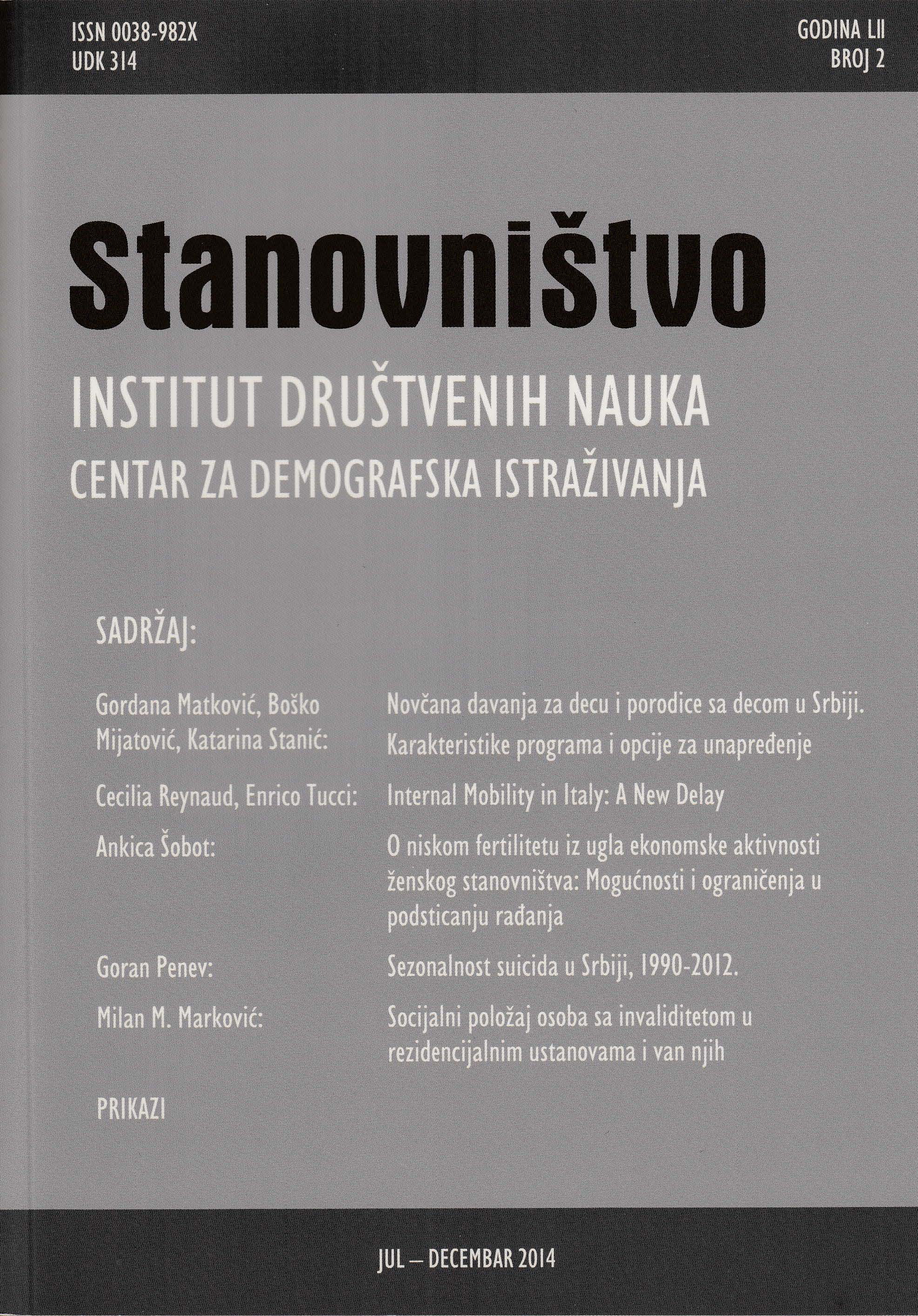
Background: In the period from 1990 to 2012, there were 32,855 suicides registered in Serbia, i.e. an average of 1428 deaths per year (18.9 per 100.000 inhabitants). The suicides were the most frequent in the early 1990s, less frequent during the 2000s, and least frequent in the last three years of the observed period (2010-2012 – an average of 1237 suicides per year). Objective: The goal of this paper is to evaluate the seasonal variations of suicides in Serbia in the period of 1990-2012, their changes, as well as the accordance with findings from other countries. Method: In the paper are used "classical" statistical methods of evaluating cyclical variations (2-test, Edwards' test) as well as some frequently used newer methods (e.g. the peak-low ratio). It also introduces a new indicator of the intensity of monthly variations in suicides (the magnitude of trimester variations of /12/ moving consecutive months index – the MtMV index). Seasonality of suicides is also observed by sex.Results: The results of the research of seasonality confirm that certain cyclical variations in mortality due to suicide are also present in Serbia. Observed by season, suicides are most frequent in spring and summer and less in winter. The cyclical nature was also clearly confirmed by month. Suicides are most frequent in "warm" months (April-August) and far less frequent in "cold" months (December-February). By month, suicides are most frequent in May, while the maximal average number of suicides per day was calculated for June (21 % higher than the average for 1990-2012). December is singled out as the month with the lowest number as well as lowest daily average of suicides (25 % lower than the average).Conclusion: The cyclical nature of suicides is clearly notable during the entire observed period and no significant fluctuations or decrease in the intensity of the variation were observed. Regardless of the method of analysis, the resulting conclusions are identical regarding the cyclical nature of the variations and the temporal characteristics of suicides in Serbia at the end of the 20th and the beginning of the 21st century.At the aggregate level there are no significant differences in seasonal variations of suicides committed by men and women. Changes also developed in parallel and in the same direction for both sexes.
More...
This paper refers about the threat of Islamic terrorism, its roots, motives, as well as its origins. Namely the author informs about the Jemaah Islamiyah, Islamic organization, which is less know in the Czech Republic. Indonesia has a larger Muslim population than any other country in the world, with approximately 202.9 million identified as Muslim (88,2 % of Indonesia’s population). It is generally regarded as a tolerant country, in which various religions are living side by side without larger problems. Nevertheless even here the danger of violent Islamic terrorism has arisen. The theme is treated in a proper historical context, with regards to possible impacts on security situation in the world.
More...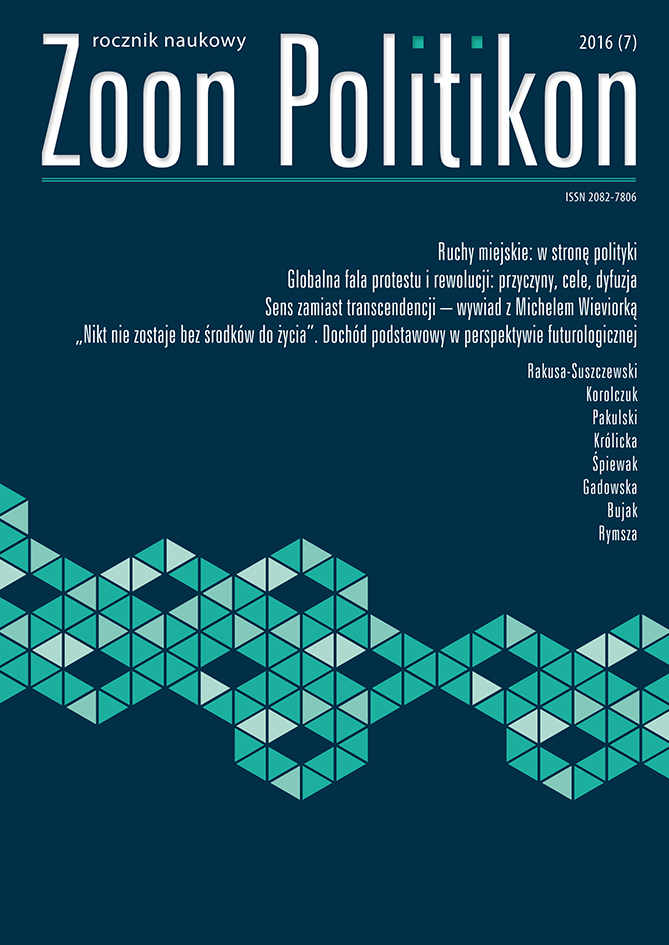
There is a strong conviction about social radicalism carrying serious threats to the public sphere, similar to all manifestations of extremism, fundamentalism and other extreme attitudes. Meanwhile, subject literature indicates how misleading such interpretations are and deviate from the complex nature of this phenomenon. Various examples of the concept of radicalism understood as philosophical, psychological and social predicament, reviewed in this article, should lead to a necessary revision of the dominant conventional interpretation of radicalism.
More...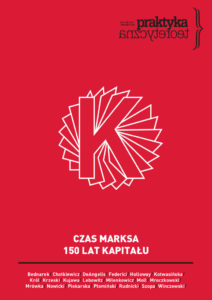
In my article I propose to see the global, multidirectional movement for the commons as a project which lies in a horizon emerging from Karl Marx’s Capital. I treat the commons as a non-capitalist alternative, organized around direct producers’ practices, which experience dispossession not only through extraction of surplus value, but also through the loss of the whole commonweal caused by the dominance of the commodity form. I use Rosa Luxemburg’s writings and books, co-authored by Antonio Negri and Michael Hardt, to point out the weaknesses of the theoretical perspective that combines the common with the disappearance of the non-capitalist outside and transformation of its inside. I refer to Massimo de Angelis to present the common as an outside and to Giorgio Agamben to exhibit the Franciscan form-of-life as a project which exceeds the inside/outside division. Different interpretations of the common in the light of the theory of the non-capitalist outside refer to competing visions of commonism.
More...
The article tells the story of the making of a little-known Polish documentary shot in 1944 and 1945. The film depicts the fate of a group of children from Warsaw who were at a summer camp in Stoczek Lukowski when the Warsaw Uprising began.
More...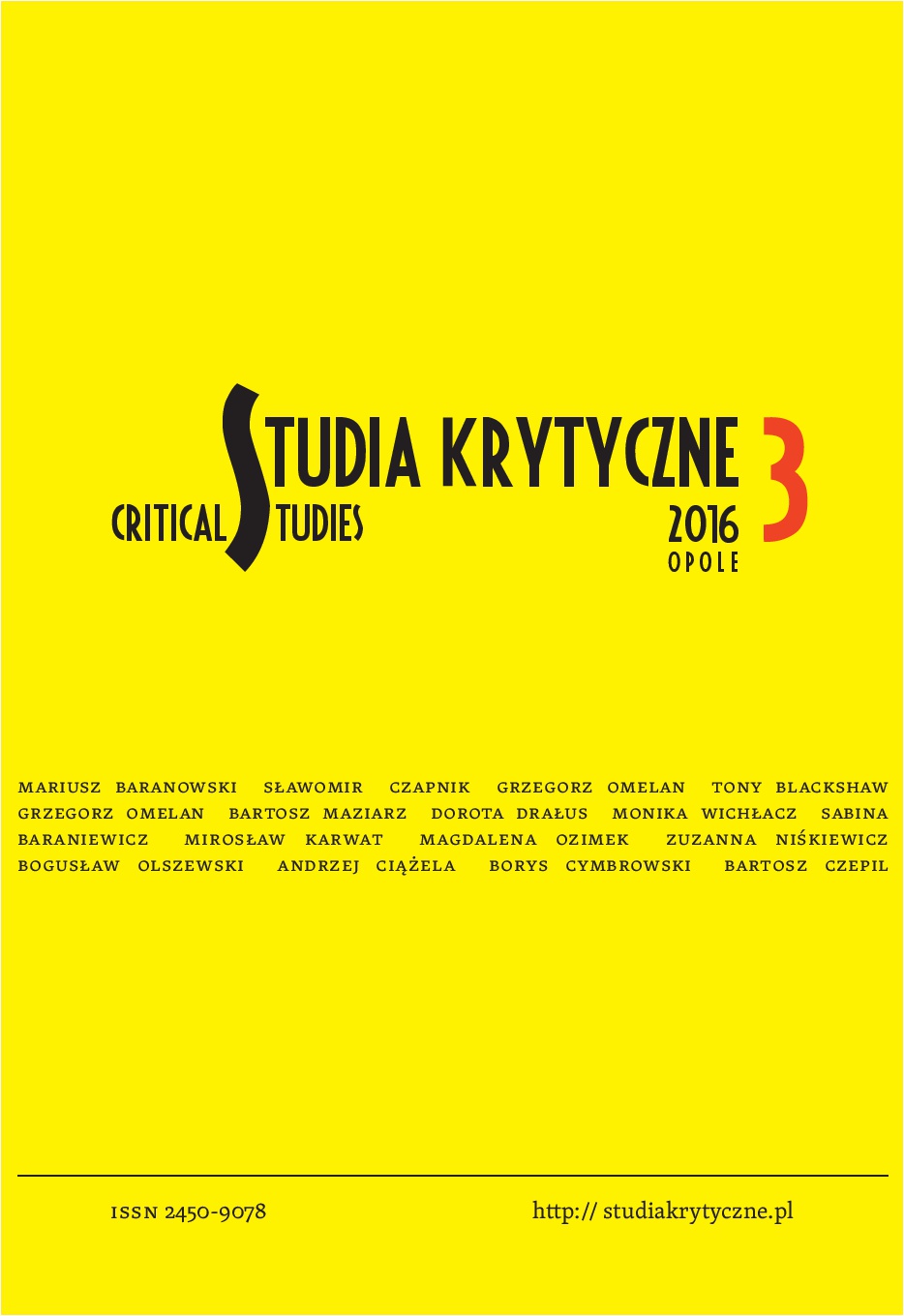
The article discusses problems of social change in Poland, which were brought about by State Socialist system installed following World War II. Assuming the thesis about a social revolution which was the result of Nazi and Soviet occupation during and immediately after the war (Leder 2014), it is argued that the methods by which the authorities used mobilized people to action were in fact a specific form of social participation, yet seldom spontaneous, but often inspired or sometimes coerced. This participation by force was an element of social mobilization and as such it contributed to legitimization of lower social classes – workers and peasants. As a result, those classes acquired ability for action; the workers felt authorized to discuss their issues with the decision-makers. By this way the former „beneficiaries” of the system were able to challenge the party apparatus and to contribute to its collapse.
More...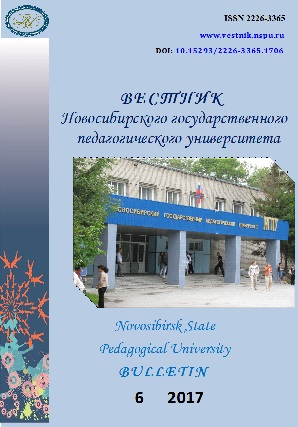
Introduction. This paper focuses on the empirical study of correlation between the sibling position and the extremist attitudes of young people. The purpose of this study is to analyze the specifics extremist attitudes of young men and women depending on their birth order. Materials and Methods. The participants of the study were 377 subjects (aged between 14 and 30 years, 176 male subjects and 201 female subjects). 100 participants are the only children, 117 ones are the first-borns, 53 ones are middle children and 106 are later-borns. Extremist attitudes of the subjects were identified using K.V. Zlokazov’s methodology of studying extremist-destructive attitudes. This technique allows us to reveal the level of authoritarianism, the manifestation of nationalistic, fanatical and xenophobic attitudes. According to E.A. Pain and S.A. Prostakov’s methodology, the subjects were supposed to choose a political slogan characteristic of an extremist trend or refuse to choose. Results. As a result of the research, a correlation was found between extremist attitudes of youth and the sibling position in the family (both gender-specific and non-gender-specific). Young males in comparison with young females are characterized by a higher level of extremism (manifested in a higher level of nationalism and xenophobia), more often identify themselves with one or another political movement. The only children in the family are characterized by a higher level of nationalist attitudes, less adhering to left-wing views. A higher level of fanaticism is revealed in only children girls and later-borns boys in the family. A higher level of xenophobia was found in single boys in the family. Conclusions. A group of only children in the family of boys entered the risk group for the formation of extremist behavior. They have a much higher degree of xenophobic attitudes, and they often choose nationalist slogans in comparison with other groups of subjects. The results of this study can be taken into account in working with young people to prevent extremist behavior.
More...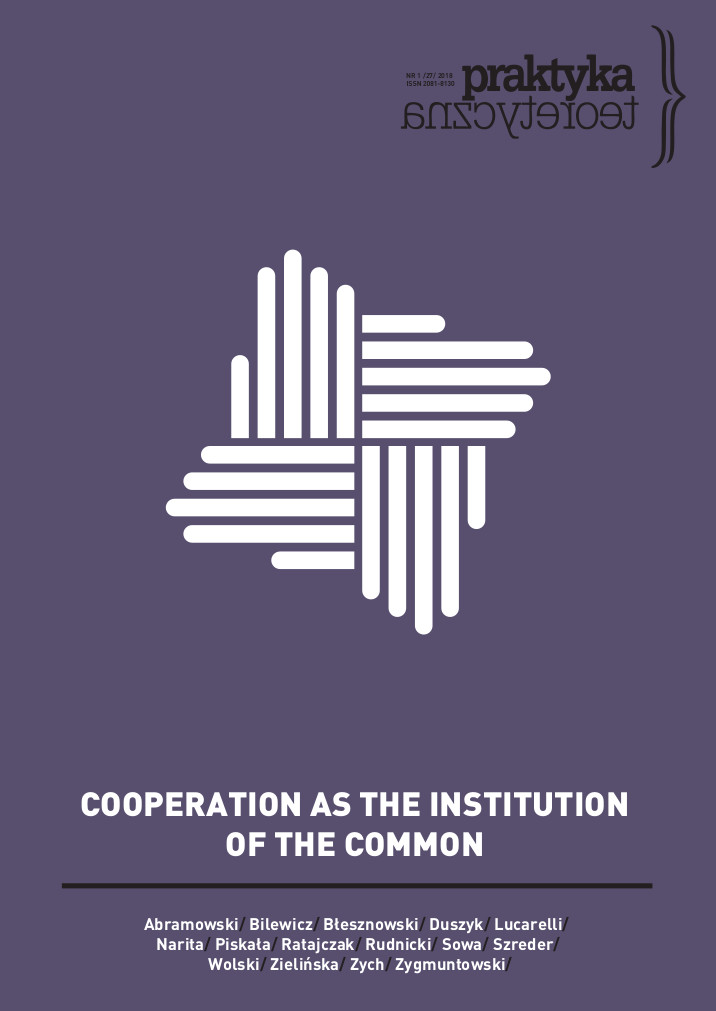
This is an introduction to the issue of Theoretical Practice (Praktyka Teoretyczna), titled “Cooperation as the Institution of the Common” (2018, no. 1).
More...
Review of: Vladimir Vuletić - Aljoša Mimica: Radikalska sociologija — Zasnivanje akademske nauke o društvu u francuskoj Trećoj republici, Gradina, Niš, 1991, 246 str.
More...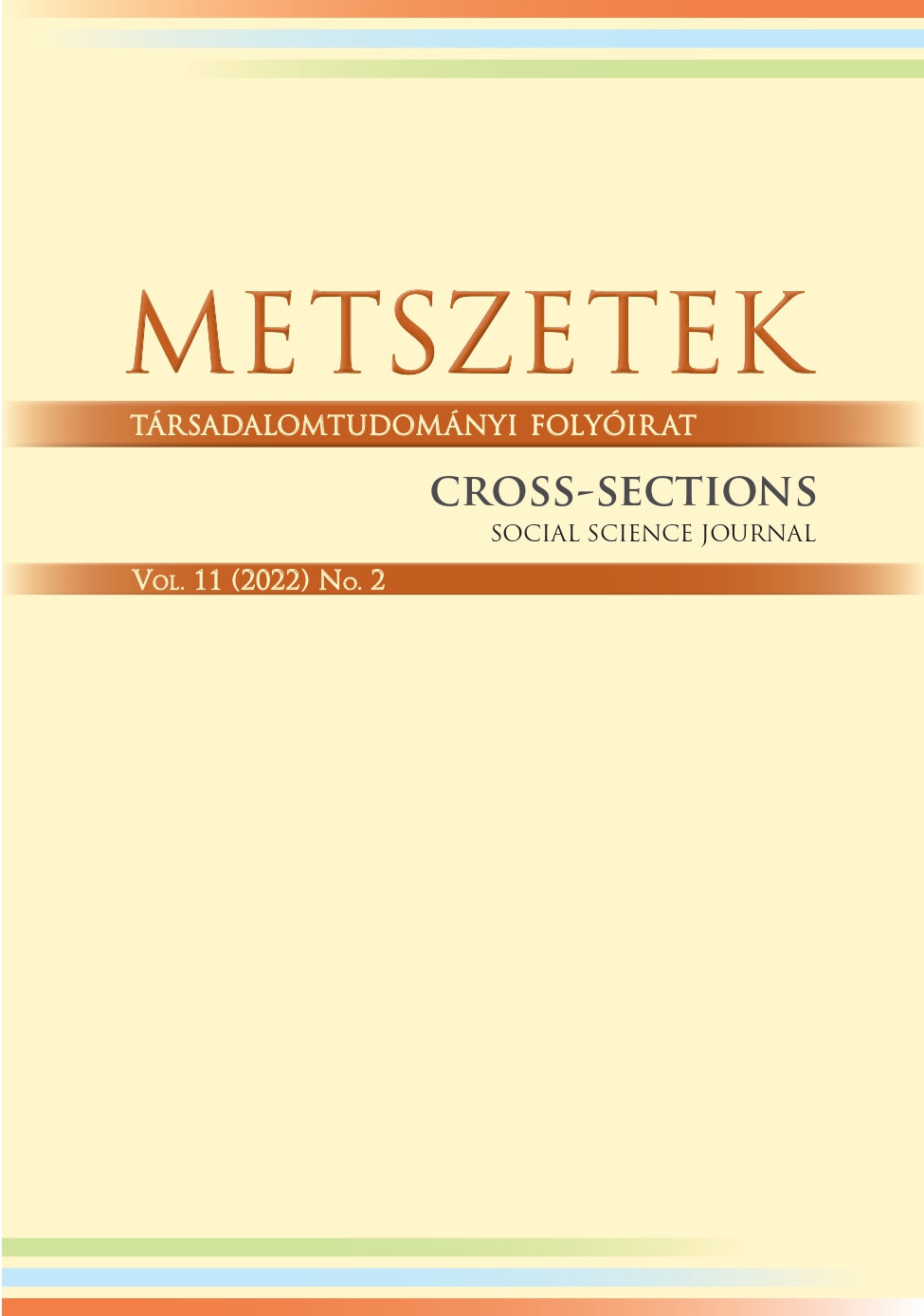
This article is an account of our practical research and cooperation experience from a participatory research project on homelessness and psychosocial disability carried out in a Hungarian university context, by a student and two experts by experience in a researcher role. We argue for the involvement of disadvantaged people using social services in research related to disadvantaged people and social services, highlighting the advantages and challenges of this kind of research based on our experience. Finally, we formulate practical recommendations that migh be useful for beginners – like we used to be – in participatory research in this field.
More...
The aim of the article is to explain, on the basis of the concept of ressentiment, the relations linking inferiority with fundamentalism, fanaticism and ideologically motivated violence. The author of the article puts forward a hypothesis regarding the sources of the latter phenomenon. The hypothesis is: in a situation where the fundamentalist values born of ressentiment and their legitimations can- not stand in the face of the doubts provided by other fundamentalisms (other competing visions of the world), faith in their metaphysical grounding is sharpened. The sharpening of faith is followed by fanatical activity aimed at dispelling the doubts that have arisen. This fanatical activity is not only an intellectual protection against doubts arising from a given fundamentalism, but a response to the external threats that may result in loss of faith. When threats are "serious", that is, when they strongly affect the worldview built on the values generated by ressentimental revaluation, they must result in frustration (related to the pain of inferiority), which under favourable circumstances turns into aggression and violence.
More...